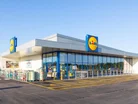Lidl Strengthens Climate Strategy with Scope 3 Targets

Discount supermarket Lidl has shared updates to its climate strategy, in its ongoing commitment to sustainability.
The German company has outlined fresh targets for lowering its Scope 1 and Scope 2 emissions, as well as its more extensive Scope 3 emissions which account for the majority of its total carbon footprint.
These changes are part of Lidl's wider efforts to meet international climate standards and achieve net zero by 2050.
Lidl's ambitious plan to reduce Scope 3 and FLAG emissions by 2034
In addition to its efforts on direct emissions, Lidl is also addressing Scope 3 emissions, which create more than 90% of Lidl’s total emissions.
- The production and transportation of goods
- Waste generated in operations
- The emissions associated with products after they leave Lidl's stores.
Lidl has set a target to reduce its Scope 3 emissions by 35% by 2034, using a 2022 baseline. Given the complexity of tackling emissions that come from a wide array of external factors and stakeholders, this target is both ambitious and necessary for meeting global climate goals.
A core focus in the Scope 3 emissions category is the reduction of emissions from agriculture, forestry and additional land use (FLAG). Lidl has dedicated itself to lowering its greenhouse gas emissions in this sector by 42.4% by 2034. FLAG emissions are particularly significant in the food industry due to the environmental impact of farming practices, deforestation, and land management, making this an essential area for Lidl to address.
Lidl GB’s WWF retailer commitment
The World Wide Fund for Nature announced that supermarket chain Lidl GB became the first discounter to sign WWF’s Retailers’ Commitment for Nature – an agreement to work with WWF to halve the environmental impact of the average UK shopping basket by 2030.
Lidl, the UK’s sixth largest supermarket, stands alongside the Co-op, M&S, Sainsbury’s, Tesco and Waitrose. This means that 60% of the UK retail grocery market is now committed to working with WWF towards this goal.
“As the first UK discounter to work with WWF on this, we’re continuing to demonstrate that affordability and sustainability don’t have to be mutually exclusive,” said Ryan McDonnell, CEO at Lidl GB. “Sustainability has been core to the Lidl business model for many years. We firmly believe it is our responsibility, through innovation, investment, and active leadership, to build a better future – for our business, our agri suppliers, the people we interact with and our planet.
“By signing up to the WWF’s Retailers’ Commitment for Nature, we are joining an important movement to make the UK food system more sustainable and build on the momentum of existing initiatives we have in place.”
Data provided for the inaugural WWF Basket report, ‘What’s in Store for Our Planet: The Impact of UK Shopping Baskets on Climate & Nature’, set a baseline for progress. Yet it also showed the size of the gap that must be closed if retailers are to meet WWF’s 2030 target.
******
Make sure you check out the latest industry news and insights at Food Digital.
******
Food Digital is a BizClik brand
Featured Articles
Fresh investment supports TRACT in enhancing tools for sustainability in the food and agricultural sectors, aligning with EU regulations
The devastating floods in Spain have shaken up the global citrus supply, heightening challenges in the fruit juice drinks market
McDonald's has spent 40 years supporting students with scholarships & plans to continue, despite Robert F. Kennedy Jr.’s plan to Make America Healthy Again



